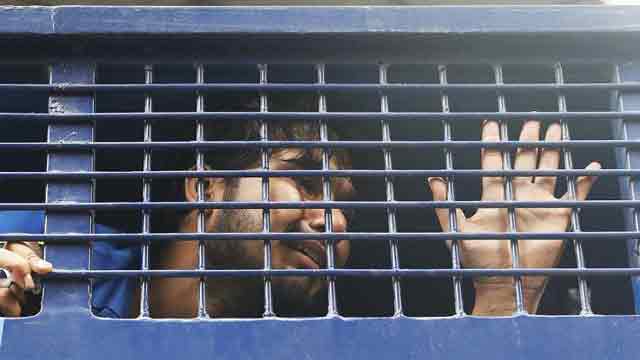Dhaka, Aug 15 (Just News): Human Rights Watch (HRW) today urged the Bangladesh government to "halt arbitrary arrests, prosecute those involved in violent attacks, and immediately and unconditionally release people it has thrown in jail just for speaking out."
Brad Adams, Asia director of the international human rights watchdog, in a news release alleged that the government led by Sheikh Hasina "appears unable to tolerate criticism after Awami League supporters attacked protesters with machetes, sticks, and metal pipes and is apparently desperate to shut down dissent.”
“The authorities should halt arbitrary arrests, prosecute those involved in violent attacks, and immediately and unconditionally release people it has thrown in jail just for speaking out.”
The HRW in the news report alleged that authorities in Bangladesh have detained dozens of people by tracking them on their social media accounts for criticising the government over violent crackdown on peaceful protesters.
Bangladesh authorities are tracking social media accounts and have detained dozens of people across the country for criticizing the government over its violent crackdown on peaceful protesters, said Human Rights Watch said.
The recent wave of arrests, targeting student protesters and journalists, has created an atmosphere of fear, putting a serious chill on free speech.
Thousands of students took to the streets after a speeding bus killed two students on July 29, 2018. The protesters called for safer roads, accountable governance, and the upholding of the rule of law but were met with teargas and rubber bullets from security forces and violent attacks by supporters of the ruling Awami League.
After police stood by while government supporters beat up the student protesters, the authorities moved quickly to stifle any condemnation of the violence. Dhaka police have been conducting block raids in residential areas of the city where many university students live. Students told Human Rights Watch that police have been going door-to-door, raiding houses, and checking phones for communications related to the protests.
Among those arrested is renowned photographer and activist, Shahidul Alam, who has been in detention for nine days, during which he says he was beaten in custody. Quazi Nawshaba Ahmed, an actress, has remained in custody, denied bail, after she was arrested on August 4, apparently accused of spreading rumors on Facebook.
Nearly all the arrests have been made under section 57 of the draconian Information and Communication Technology Act (ICT Act). Section 57 authorizes the prosecution of anyone who publishes, in electronic form, material that is fake and obscene; defamatory; “tends to deprave and corrupt” its audience; causes, or may cause, “deterioration in law and order”; prejudices the image of the state or a person; or “causes or may cause hurt to religious belief.”
The vague and overly broad law has been used repeatedly over the years to stifle criticism. Bangladesh authorities had earlier recognized that the law is misused and stated that the government has no intention of curbing free speech. Instead, Bangladesh authorities have done just that, Human Rights Watch said.
The Police Cybercrime Investigation Division posted on Facebook on August 7 that “We too desire safe roads, but we request that concerned citizens please help us by providing us with the [social media] post links and detailed addresses of those plotting to create chaos in the country by spreading rumors in the country and abroad. We are committed to bringing these propagators under the law, wherever they are, in the country or abroad.” The Criminal Investigation Department shared the post on August 9. On August 10, students who had supported the protests or called for Alam’s release told Human Rights Watch they received anonymous calls threatening them to be quiet on social media or face consequences.
Section 57 of the ICT Act is a vaguely worded law that is used to silence criticism; fewer than half of the arrests under the act actually result in convictions. In September 2017, Muhammad Nazrul Islam Shamim, special public prosecutor of the Cyber Tribunal, told The Dhaka Tribune that “some cases are totally fabricated and are filed to harass people.”
“Bangladesh authorities should accept that criticism, including from young people, is part of a vibrant and healthy democracy,” Adams said. “The Bangladesh government should, once and for all, replace the ICT Act with one that upholds the principles of freedom of expression and stop intimidating those who hold it accountable.”
(Justnews/ys/1400hr)





